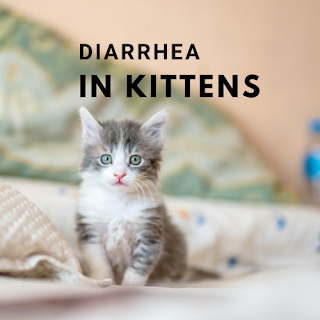Image courtesy Kote Puerto via Unsplash
There can be a few reasons why kittens get diarrhea. It could be due to parasite, food changes or an illness.
If it is due to parasites, then you need to ensure that you give your kitten a dewormer tablet from 2 weeks of age and again every 2 weeks
after that until they reach 16 weeks old. A kittens age and weight will determine
how much they received.
Another reason that your kitten might have diarrhea could might be due to an illness. If this is the case then you will need to bring them to the veterinarian to ensure that you get a proper diagnoses as early as possible. This might require a faecal analysis of your kitten's poop to see what the cause of their diarrhea could be. Once they know the problem, then they can start the appropriate treatment.
The first issue that most often could be the culprit when it comes to kitten diarrhea is a change in their food. Kittens have very sensitive tummies and when they are taken away from their mother too young and then rehomed, the stress as well as the change in their diet can cause them to get diarrhea. They might have some GI (gastrointestinal tract) issues due to sensitivity to the food that they are being fed.
1. Change in Milk
When kittens are born they exclusively drink their mother’s milk. However you can gradually start introducing them to solid foods around the time that they are about 5 to 6 weeks of age. At this age you can start to gradually introduce wet cat food. However when a young new-born kitten loses its mother too early, it will need to be fed a special kitten milk formula until it gets strong enough to eat solids.
Changing a kitten immediately over to solids without a gradual introduction to food especially if it has been exclusively drinking its mother’s milk or kitten formula, can sometimes upset their little bellies and they might start getting diarrhea because of it. Once their tummies adjust to this new change they should recover and their poop should return to a soft worm like poop that is yellow in color.
If they continue to have diarrhea then something is not right with the kitten. They may have some type of gastritis infection in their stomach. A kitten with diarrhea should never be ignored because when they are that young, diarrhea can be a serious condition that if ignored could lead to dehydration or death.
2 Switching to Wet Food to Fast
The switch from milk to wet food needs to be done gradually. Taking a 6 week old kitten away from its mom and expecting it to eat wet food without any issues is not a smart idea. Their little bellies are only used to just drinking milk and when you start introducing wet food, you need to gradually get the kitten used to eating it. Continue to let it suckle from it's mom if she is still around or supplement with kitten formula but then gradually start to introduce wet kitten food alongside that meal.
If you switch your kitten to wet food too fast and don’t give their bellies time to adjust to this change, then you are sure to see light colored loose soft stool that is similar to cream.
3. Introducing Kitten Nuts to Fast
You need to adopt a similar method to that of wet cat food when introducing your kitten to kitten nuts. Don’t put a full bowl of kitten nuts out and expect your kitten to start eating them and be absolutely fine. Gradually start introducing 5 to 10 grams of kitten nuts each day and let them get used to this type of food.
If you give your kitten too much kitten nuts, then it will just gobble them all up and
not chew them. So start giving them the kitten nuts as a little treats for good behavior and then feed your kitten 5 to 10 grams a day and gradually increase the
volume you give them each week by a gram or two.
Initially you will see a change in their poop if you exclusively give them dry nuts without wet food or milk. You can again expect to see very light colored soft poop similar to that of cream.
Poop Patrol
Monitoring your kittens poop is something you need to regularly do because this will be the only indicator that something could be wrong with your kitten. If they continue to have normal looking poop, it can mean that their little tummies are able to accept the food that they are eating.
However if they start having diarrhea again for more than 2 days, then you really need to find out the cause because excessive diarrhea can lead to dehydration which is dangerous for kittens.
Weight Control
When you have a kitten, you need to start weighing them each day to see if they are gaining weight. Use an electronic kitchen scale that has grams on it. If you don’t have a small bowl, you can cut a cereal box in half and use this instead. It also has the added benefit of not letting them twist around too much while you are trying to get an accurate reading.


Comments
Post a Comment